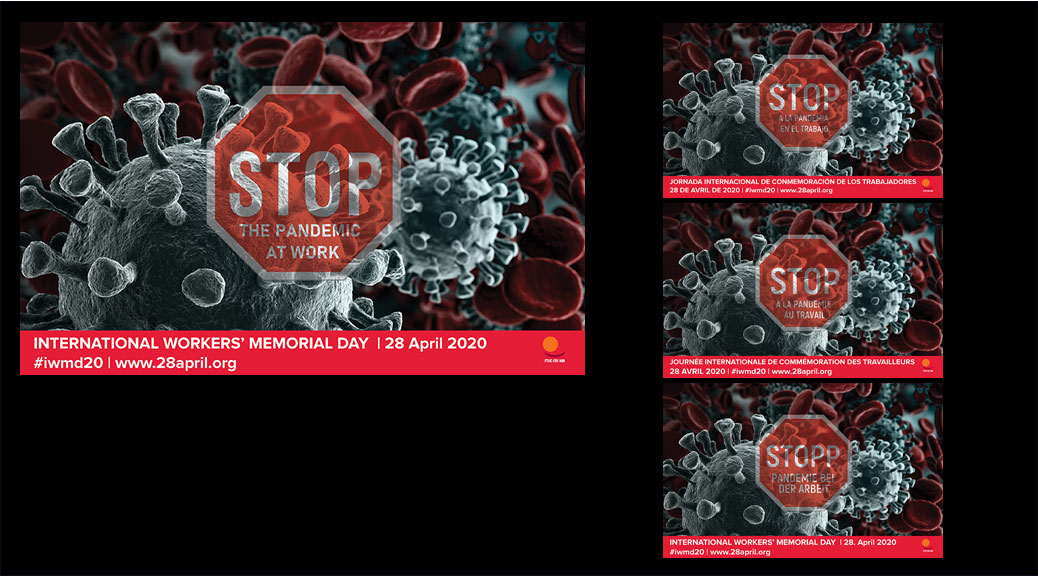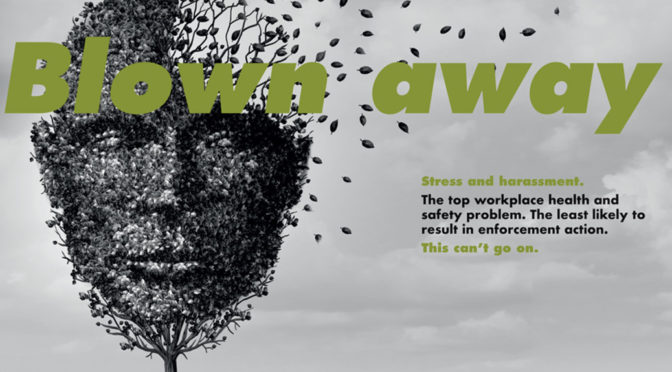«Lutter contre les risques psychosociaux au travail: éliminer le stress au travail»
#iwmd20

- 28 de Abril Jornada Internacional de Conmemoración (JIC) de los Trabajadores Fallecidos y Heridos
- 28 Avril Journée Internationale de Commémoration (JIC) des travailleurs décédés et blessés
- 28 April International Workers’ Memorial Day
- 28 April International commemoration day for dead and injured workers 28 April International day of mourning
Le 28 avril 2020, le thème de la campagne sera le suivant: «Lutter contre les risques psychosociaux au travail: éliminer le stress au travail». Nous chercherons à attirer l’attention sur le préjudice provoqué par le stress au travail et les troubles connexes, tels que la dépression, l’angoisse, le burnout, la dépendance à l’alcool et aux médicaments due au travail et le suicide lié au travail.
Ce thème nous invite à promouvoir les solutions permettant de faire face aux multiples facteurs à l’origine des risques psychosociaux, et d’en examiner d’autres qui ne sont pas fondamentalement associés à la santé et à la sécurité au travail, notamment:
– faible salaire, salaire au rendement, salaire aux pièces
– charge de travail, horaires et régime de travail
– effectifs insuffisants
– précarité de l’emploi, réduction des effectifs
– travail précaire/informel, «petits boulots»
– politiques punitives en cas d’absence pour maladie
– procédures disciplinaires punitives
– gestion des résultats et systèmes d’évaluation oppressifs
– production au plus juste, nouvelles techniques de gestion, sécurité comportementale
– surveillance au travail
– manque de contrôle
Les syndicats ont par ailleurs constaté une lacune dans les instruments de l’OIT qui, en effet, ne traitent pas explicitement des risques psychosociaux. C’est pourquoi, à l’occasion de la journée du 28 avril, nous pourrions solliciter une convention de l’OIT dans ce domaine, et demander l’allongement de la liste des maladies professionnelles répertoriées par l’OIT pour y inclure des données plus détaillées sur les troubles et les impacts psychosociaux dus au travail, en faisant explicitement référence à la nécessité d’agir pour enrayer le problème croissant des suicides liés au travail.
Il serait également possible d’établir un lien avec les campagnes syndicales internationales existantes sur le travail précaire, les faibles salaires, les niveaux suffisants de salaire et de personnel, et sur d’autres questions. Nous pourrions aussi mettre en avant les meilleures pratiques en termes de lois, d’accords, de mesures, de ressources syndicales et de campagnes.
La CSI donnera des informations plus détaillées sur la campagne du 28 avril 2020 au début de l’année prochaine.
Au cours des semaines à venir, nous publierons des mises à jour et nous indiquerons des ressources sur les pages web relatives au 28 avril à l’adresse www.28april.org
Entre-temps, si vous avez connu des expériences fructueuses sur cette question et que vous souhaitez les voir figurer dans nos matériels, veuillez les envoyer par courriel sur la liste, ou directement à mon adresse editor@hazards.org
Voici plusieurs liens et informations générales:
www.hazards.org/mentalhealth
www.hazards.org/lowpay
www.hazards.org/insecure




